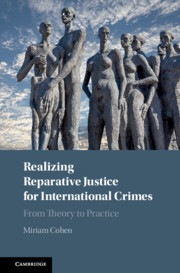Book contents
- Realizing Reparative Justice for International Crimes: From Theory to Practice
- Realizing Reparative Justice for International Crimes
- Copyright page
- Dedication
- Contents
- Foreword
- Acknowledgments
- Table of Cases
- Abbreviations
- Prologue
- Introduction
- 1 Punishment and Reparation
- 2 Reparative Justice at International and Hybrid Criminal Tribunals
- 3 The Construction of a Reparative Dimension of International Justice Before the International Criminal Court (ICC)
- 4 Victims of International Crimes Within Administrative Mechanisms
- 5 The Role of National Courts and Mechanisms in Realizing Reparative Justice for International Crimes
- 6 Conclusions
- Bibliography
- Index
1 - Punishment and Reparation
Construing the Legal Basis of a Duty to Repair in International Criminal Law
Published online by Cambridge University Press: 16 June 2020
- Realizing Reparative Justice for International Crimes: From Theory to Practice
- Realizing Reparative Justice for International Crimes
- Copyright page
- Dedication
- Contents
- Foreword
- Acknowledgments
- Table of Cases
- Abbreviations
- Prologue
- Introduction
- 1 Punishment and Reparation
- 2 Reparative Justice at International and Hybrid Criminal Tribunals
- 3 The Construction of a Reparative Dimension of International Justice Before the International Criminal Court (ICC)
- 4 Victims of International Crimes Within Administrative Mechanisms
- 5 The Role of National Courts and Mechanisms in Realizing Reparative Justice for International Crimes
- 6 Conclusions
- Bibliography
- Index
Summary
Chapter 1 provides an overview of different theories of justice and how they can inform the development of a civil dimension of international criminal law. This chapter also traces the evolution of different dichotomies of the legal duty to provide reparations and the right to reparation: from perspectives of state versus state, to state versus individual, to individual versus individual. It also outlines the development of a duty to repair for individual perpetrators alongside states’ duty to repair. This introductory chapter thus provides the theoretical foundation that supports the analysis in the following chapters and it sets out the main themes that are discussed throughout the book. This chapter also lays out and discusses some challenges and counterarguments to the inclusion of a reparative dimension to international criminal justice from a theoretical perspective. Finally, this chapter draws on the enlightening jurisprudence of the Inter-American Court of Human Rights.
Keywords
- Type
- Chapter
- Information
- Realizing Reparative Justice for International CrimesFrom Theory to Practice, pp. 12 - 51Publisher: Cambridge University PressPrint publication year: 2020

